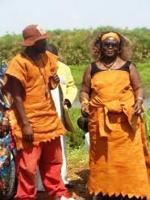Kenya Safari Rules Part2
Kenya Safari Rules Part2 is a Continuation of Kenya safari laws part 1 and what you should avoid while on your vacation in Kenya. On this page we continue to give you all the detailed information you may need to plan a cheap vacation in Kenya.
Currency
Kenya's currency is based on the decimal system. The unit is the Kenya "Shilling", divided into 100 cents.
Coins are of 5, 10, 50 cents and of 1, 5 and 10 Shilling. Notes are of Kshs 20, Kshs 50, Kshs 100, Kshs 200, Kshs 500 and Kshs 1,000. There are no restrictions on the movement of currency into or out of Kenya for current transactions.
Travellers can bring into or take out of Kenya currency notes up to the equivalent of US Dollars 5,000 and Kshs. 100,000 without making a custom declaration. Currency notes in excess of the above amounts can still be brought in or taken out of Kenya upon making a declaration
Customs
You may import personal effects like binoculars, cameras and films temporarily into the country without a permit but a customs bond will be required for video equipment, musical instruments, radios cine and slide projectors and tape recorders during your stay.
Consumables in small amounts of one liter of alcohol, a quarter liter of perfume, fifty cigars, two hundred cigarettes or quarter kilogram of tobacco will be allowed duty free.
Obscene literature is not allowed. Pets accompanied by a recent health certificate and special permission from the Commissioner of Customs will be allowed.
These are , however, not allowed into the National Parks /Reserves. Firearms cannot be imported without an import certificate from the Central Firearms Bureau (P O Box 30263, Nairobi, Kenya).
Departures
In addition to the other security checks, customs officers may weigh and inspect all outgoing baggage. Departing travellers are therefore required to identify their baggage for inspection by the custom officers.
Airport departure tax is included on your airline ticket. There are duty-free shops at both Nairobi and Mombasa Airports
Dress
Visitors should not walk in towns or public areas in their swimming wear as this is against the African culture and offends a large section of the community. Nude bathing is not allowed.
Kenyans appreciate decent behavior devoid of immoral tendencies. Visitors are therefore advised to show respect to the local people, their culture and traditions. The locals do not appreciate the western style of sophistication very much.
Entry
Always enter and leave the park through official entry points after paying the prescribed fee. Retain your ticket during your visit.
At the time of entry, you may leave a word at the gate as to which part of the park you intend to visit in case you may get stuck (during wet seasons) or your car breaks down. Similarly you may ask for information at the gate concerning the condition of the park, especially during the wet seasons. Avoid travelling alone.
Hunting and Game Trophies
Hunting and trafficking in game trophies is banned in Kenya.
Export of live animals, birds and reptiles is also banned except by a licensed professional dealer with special permission from the Director of Kenya Wildlife Services.
However, there is a beautiful souvenir market in local handicrafts-wood and stone sculpture, bead work, painting and drawing, basketry, wearing apparel and jewelery.
Exciting photographic safaris to the National Parks/Reserves and to other touristic areas are organised.
Always ask for permission before photographing the local people. Obscene photography is forbidden. It is an offense to photograph the National flag, The President, State Lodges, Soldiers, Prisons and Convicts and Military Barracks.
However, photographers find a paradise of colourful birds, beautiful people and magnificent scenery all embellished in regular sunshine.
Laws and Respect for Authority
Visitors are expected to show respect for the Head of State and other leaders or uniformed officials of the Public Service.
Tearing or burning of President's portrait is an offence. Avoid infringing the law especially the Foreign Exchange Control Act, traffic regulations and the laws against prostitution, sexual abuse and taking or trafficking in drugs.
Foreign offenders are usually arraigned and fined or ordered to leave the country. Smoking opium or cannabis sativa, also locally called "bhang", is forbidden and anyone trying to import or export it, hidden in his or her baggage puts himself in serious trouble.
However, chewing of a locally grown shrub called "miraa", a mild stimulant reputed to keep chewers active and awake throughout the night is allowed.
Touring Programs - Safaris
Local tour operators have developed three main tourist circuits to enable their clients utilize their time fully and get the best out of their safari in Kenya.
These are the western, central/northern and southern circuits. The circuits can be shortened or stretched further afield depending on the clients own wishes and the time the visitors want to spend in Kenya.
USEFUL TIPS; BEFORE AND AFTER ENTERING THE NATIONAL PARKS
Noise
Making noise or hooting while inside the park disturbs the animals and ruins your chance of good viewing, besides annoying other visitors in the park. Cars with defective noise-making exhaust systems will be denied entry.
Pets
Pets carried into the national park will frighten and cause stampede among wild animals or provoke confrontation with animals, thus affecting your own safety. So pets are not allowed in the parks/reserves
Short-Cuts
Driving off the park roads to get closer to animals or gain a better view does not only destroy the vegetation and ruin the scenic values rendering the areas susceptible to soil erosion but also disturbs the animals and upsets their breeding and feeding habits.
You also risk getting stuck while driving on those un-murramed roads. Always keep to the official roads and resist the temptation of chasing hunting or mating cats or surrounding them at their kill with car engine on and clicking cameras.
Some of them especially the cheetah are sensitive animals which hunts by day and are easily disturbed. When a number of tourist cars follow a hunting cheetah, it may either abandon the hunting effort or the prey may be alerted thus causing the hunt to be unsuccessful.
In such cases the cheetah and her cubs may go without food for several days.
Speed
For your own safety and that of animals, drive at no more than 40 kilometers per hour while in the park.
Animals are apt to trot or jump across the road unexpectedly. Controlled speed also enhances your chance of seeing elusive animals like leopards, caracal or several cats hidden behind bushes or gullies and enables you to get closer to animals for better viewing and photographs.
Visiting Time
It is an offense to be in the park or drive in the park at night or during the hours of darkness (7 p.m.).
Plan well ahead so that you reach your campsite or lodge before dark to avoid driving in the park at night (after 7 p.m.). Entry is forbidden after 6.15 p.m.
You are also advised to avoid going in the park after downpours and if you do, be careful when crossing unbridged streams and rivers whose water levels may fluctuate after the rains.
Kenya Safari Rules Part2 Back to Cheap Kenya Vacation Tips Home Page
Go Back to Our Site Map / Index
Recent Articles
-
Garam Masala Appetizers ,How to Make Garam Masala,Kenya Cuisines
Sep 21, 14 03:38 PM
Garam Masala Appetizers are originally Indian food but of recent, many Kenyans use it. Therefore, on this site, we will guide you on how to make it easily. -
The Details of the Baruuli-Banyara People and their Culture in Uganda
Sep 03, 14 12:32 AM
The Baruuli-Banyala are a people of Central Uganda who generally live near the Nile River-Lake Kyoga basin. -
Guide to Nubi People and their Culture in Kenya and Uganda
Sep 03, 14 12:24 AM
The Nubians consist of seven non-Arab Muslim tribes which originated in the Nubia region, an area between Aswan in southern







New! Comments
Have your say about what you just read! Leave me a comment in the box below.